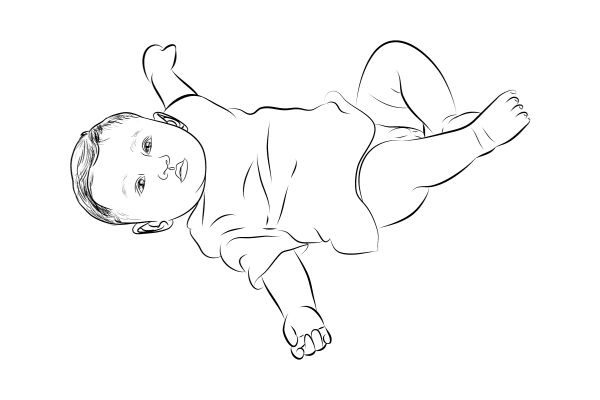Managing a newborn’s sleep patterns can be a challenging experience for new parents, as it involves a rollercoaster of emotions. One of the most common concerns is whether the baby is getting enough sleep or if they’re becoming overtired. Recognizing the signs of an overtired baby and learning how to help them sleep peacefully is crucial. This article will cover why your baby is overtired, the signs to look out for, ways to help them sleep, and tips to prevent overtiredness in the first place.
Why Do Babies Get Overtired So Easily?
Babies (espeially newborns) have undeveloped circadian rhythms which regulate sleep and wake cycles. It means they don’t yet have a well-established day-night sleep pattern, making it easier for them to become overtired. Several factors contribute to this susceptibility:
- Limited Self-Regulation: Infants have limited ability to self-regulate their sleep. They rely on external cues, such as darkness, quiet, and a soothing environment, to fall asleep and stay asleep.
- Short Sleep Windows: Newborns have short windows of wakefulness, usually only about 45 minutes to 1.5 hours. Missing this window can lead to overtiredness.
- Inconsistency: Early infancy is marked by irregular sleep patterns. Babies may sleep for a few hours at a stretch one night and then be wakeful the next.
- Growth and Development: Babies go through rapid growth and development, which can disrupt sleep patterns. Growth spurts, teething, and developmental milestones can make them more prone to overtiredness.
Signs of an Overtired Baby
 Recognizing the signs of an overtired baby is essential for providing them with the rest they need. Here are some common indicators:
Recognizing the signs of an overtired baby is essential for providing them with the rest they need. Here are some common indicators:
- Fussiness and Irritability: An overtired baby is often fussier and more irritable than usual. They may cry more frequently and find it difficult to settle down.
- Difficulty Falling Asleep: Contrary to what you might expect, an overtired baby may struggle to fall asleep. They can become restless and agitated, making it challenging for them to self-soothe.
- Rubbing Eyes and Yawning: Just like adults, overtired babies may show physical signs of tiredness, such as rubbing their eyes, yawning, or looking glazed.
- Hyperactivity: Some babies react to overtiredness with bursts of hyperactivity. They may appear overly alert, wide-eyed, and even more active than when they are well-rested.
- Shortened Sleep Duration: Overtired babies tend to have shorter and more fragmented sleep cycles, leading to frequent night awakenings.
How to Get an Overtired Baby to Sleep
When you’ve identified that your baby is overtired, there are several strategies you can employ to help them get the sleep they need:
- Create a Calm Sleep Environment: Ensure your baby’s sleep environment is comfortable, dark, and quiet. Dim the lights, use white noise if necessary, and maintain a consistent bedtime routine to signal that it’s time for sleep.
- Swaddle or Use a Sleep Sack: Swaddling can help calm an overtired baby by mimicking the feeling of being in the womb. Alternatively, you can use a sleep sack to provide a cozy, secure environment.
- Offer a Pacifier: Some babies find comfort in sucking on a pacifier, which can help soothe them to sleep.
- Rock or Use Gentle Motion: Rocking your baby or using a gentle, rhythmic motion can be comforting and help them drift off to sleep.
- Feeding: If it’s been a while since your baby’s last feeding, a small feed can sometimes help them relax and fall asleep more easily.
- Skin-to-Skin Contact: Holding your baby close and engaging in skin-to-skin contact can be soothing and help them settle down.
- Stay Calm: Babies are highly sensitive to their caregiver’s emotions. Stay calm and patient, even if your baby is fussy. Your calm presence can help them feel secure.
How to Prevent Your Baby from Getting Overtired
Preventing your baby from becoming overtired is often easier than trying to soothe an already overtired baby. Here are some tips to help you establish healthy sleep habits and avoid overtiredness:
- Establish a Routine: Create a consistent sleep routine that includes regular nap times and a bedtime routine. This helps your baby establish a predictable sleep pattern.
- Watch for Sleep Cues: Pay attention to your baby’s cues for sleep, such as rubbing their eyes, yawning, or becoming fussy. These signs indicate it’s time for sleep.
- Monitor Awake Time: Be mindful of your baby’s wakeful windows and aim to put them down for a nap or bedtime within that timeframe to prevent overtiredness.
- Limit Stimulation: Reduce exposure to stimulating activities or environments close to nap or bedtime. Calm and quiet activities can help your baby wind down.
- Create a Comfortable Sleep Space: Ensure that your baby’s sleep environment is conducive to rest—comfortable bedding, proper room temperature, and minimal distractions.
- Avoid Overstimulation: Limit exposure to screens and loud noises, especially before bedtime. Overstimulation can make it difficult for your baby to settle down.
- Practice Patience: Remember that establishing healthy sleep habits can take time. Be patient and consistent in your efforts to help your baby get the sleep they need.
Related: Parenting an Anxious Child: Navigating the Challenges with Understanding and Support
Final Words
In conclusion, understanding the signs of an overtired baby and knowing how to help them sleep is essential for both the baby’s well-being and the sanity of new parents. Babies can become overtired due to their undeveloped sleep patterns. With patience and a consistent sleep routine, you can help your little one establish healthy sleep habits and enjoy more peaceful nights for everyone in the household.





